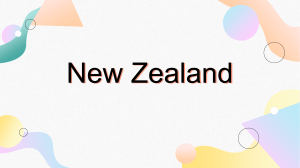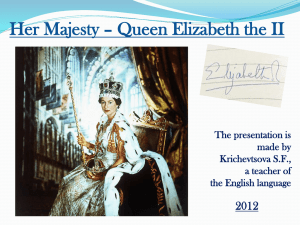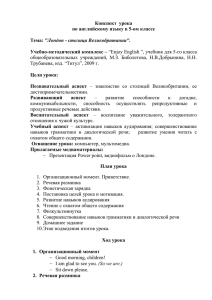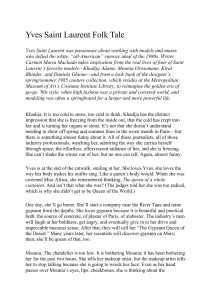ОТКРЫТЫЙ УРОК ДЛЯ 10 КЛАССА ПО ТЕМЕ «ПОЛИТИЧЕСКИЕ СИСТЕМЫ»
реклама
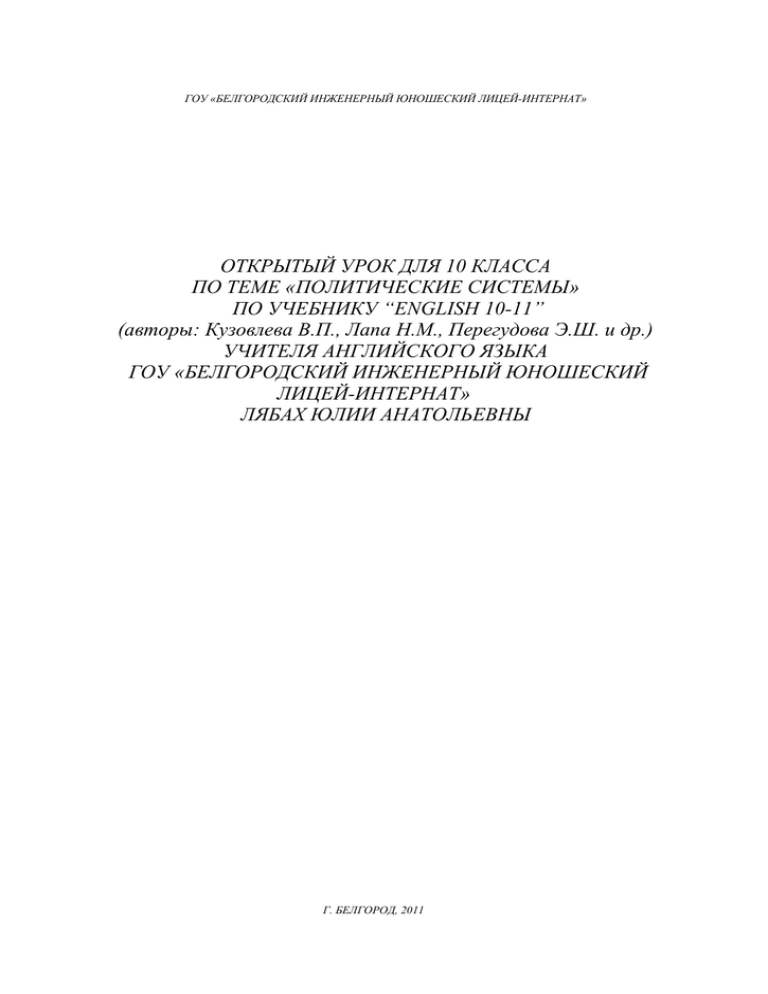
ГОУ «БЕЛГОРОДСКИЙ ИНЖЕНЕРНЫЙ ЮНОШЕСКИЙ ЛИЦЕЙ-ИНТЕРНАТ» ОТКРЫТЫЙ УРОК ДЛЯ 10 КЛАССА ПО ТЕМЕ «ПОЛИТИЧЕСКИЕ СИСТЕМЫ» ПО УЧЕБНИКУ “ENGLISH 10-11” (авторы: Кузовлева В.П., Лапа Н.М., Перегудова Э.Ш. и др.) УЧИТЕЛЯ АНГЛИЙСКОГО ЯЗЫКА ГОУ «БЕЛГОРОДСКИЙ ИНЖЕНЕРНЫЙ ЮНОШЕСКИЙ ЛИЦЕЙ-ИНТЕРНАТ» ЛЯБАХ ЮЛИИ АНАТОЛЬЕВНЫ Г. БЕЛГОРОД, 2011 Western Democracies. Are They Democratic? For the 10th grade students Представленный урок проводится в десятом классе с целью обобщения языкового и речевого материала по теме « Western Democracies» (English 10-11, авторы: Кузовлева В.П., Лапа Н.М., Перегудова Э.Ш. и др.) Урок совершенствования речевых навыков в новых ситуациях. На уроке реализован основной принцип обучения иностранным языкам принцип коммуникативной направленности. Для этого на уроке использовались методы личностно-ориентированного обучения - обучение в сотрудничестве, метод пилы, проблемные ситуации. Использование этих методов позволило значительно увеличить время говорения каждого ученика, активизировать познавательную речемыслительную деятельность учащихся, создать условия для развития умений работать в группе. Дети с удовольствием принимают участие в подобных уроках, поскольку у них есть возможность выступать в той или иной роли, а также принимать участие в групповой работе. Цель: Совершенствование речевых навыков учащихся. Задачи: 1. Совершенствование навыков аудирования с извлечением специальной информации, а также с общим охватом содержания. 2. Совершенствование навыков чтения с извлечением конкретной информации. 3. Развитие навыков работы в группе. 4. Совершенствование навыков диалогической, монологической речи. Оборудование: УМК «English 10-11» (авторы: Кузовлева В.П., Лапа Н.М., Перегудова Э.Ш. и др.), компьютер, CD-диск, компьютер, аутентичные тексты. Ход урока. I Warming-up activity T:Good morning! Glad to see you! How are you? What are your associations with the word ‘democracy?’ What do you think "democracy" means? II Aims of the Lesson T: You've learned so much about the political systems of the UK, the USA and Russia that you can work as experts in this field. Let’s imagine you are representatives of these countries at the 3G summit. You gathered here to discuss the idea of democracy which plays a great role in politics. Do the majority of people live under democratic systems? Does much depend on a politician? What kind of people can succeed in politics? You'll read interesting texts about it and you'll share your opinions about these problems. What are your aims of today's lesson? What would you prefer to learn and discuss? (Класс делится на 3 группы представителей из трех стран.) III Phonetic drill T: We are going to speak English much today. Let's practice our phonetics. The President proposes, but Congress disposes. T: Say it with a question, with excitement, with confidence. T:What idea does the saying suggest? IV Dilogues T:What else is important for real democracy? (ex.1 p.40) Share your opinions in pairs. P1↔P2 V Group work T: As experts at the G3 summit, please analyze if the political systems of your countries (Russia, the USA, the UK) are democratic and why. 1) Discussions in 3 groups. 2) Reports from each group. Questions from the groups VI Listening comprehension. Making the scheme. T: You have proved to be really smart experts on political problems. Now you'll hear the information about the political system of New Zealand. Listen to the text and make the scheme of the political system of New Zealand. (Working in groups). (Группам выдаются листы, фломастеры для создания схемы политической системы Новой Зеландии по аналогии с теми, которые они рассматривали в учебнике на стр.42,44,48) T: - Which institutions represent the legislative and executive branch of power? - How do the branches of power interact? The text for listening comprehension: (ex.1, p.64) New Zealand is a member of the Commonwealth of Nations. Though New Zealand is an independent state the British Queen is the head of state there, so, the country is a constitutional monarchy and a parliamentary democracy. Its form of government reflects its historical link with Great Britain. The Queen is represented by the governor-general. Like in Great Britain, the Parliament represents the legislative branch though the Parliament in New Zealand has only one chamber, the House of Representatives. There are 120 members and. they are elected by the people. The main political parties are the National Party and the Labour Party. The leader of the party that has the majority of seats in the House becomes prime minister. He appoints ministers, heads of the formal Executive Council and the informal but influential Cabinet. The British monarch appoints the governor-general who is part of the Executive Council. New Zealand has no written single constitutional document. The Constitution Act of 1986 determines the distribution of powers: legislative, executive and judicial. T: Present your schemes, comment on the schemes. Make the conclusion-Is the political system democratic? VII "Cocktail Party" T: People often criticize government and government policy. They always want to express their options and correct wrongs. As the experts of the G3 summit find out wishes and opinions of the politicians of your partner countries, Ask and report: What would he/she like to change in the country? What would he/she do if he/she were the president? 1) P ↔ P (Pupils can go round the class and choose any partners ) ↕ ↕ P↔ P 2) Reports P1, P2, P3 VIII Jig-saw reading T: It is very important to have the head of state who is democratically elected. Read the texts about the heads of states. Learn the main facts about their life and political career so that you'll be able to discuss them in other groups and fill in the table. (Приложение 1,2,3,4) T: In your home-groups comment on the texts, make the conclusions what kind of politicians they are. Were all of them elected? Are they ideal politicians for democratic countries? PERSONAL DATA POLITICAL CAREER MAIN ACHIEVEMENTS Elizabeth II Barack Obama Dmitri Medvedev Group 1 Group 2 Group 3 IX Class discussion T: In establishing democracy much depends on a politician. Very soon you'll be 18 and have the right to vote. Do you care what kind of people will represent you and your region in the Federal assembly? What kind of person can be an ideal politician in a democratic country? Do you know such people in your country? (ex3p56, p63) X T: So what have you learnt at our lesson? What conclusions can you make? P: I've learnt.... XI T: What do you feel at the end of the lesson and why? XII The Summery/ Evaluation of the work XIII H/w p.62 Приложение 1 Elizabeth II (Elizabeth Alexandra Mary Windsor; born 21 April 1926) is Queen of 16 sovereign states, holding each crown and title equally. However, she is more directly involved with the United Kingdom, where the Royal Family resides, and the Monarchy is historically indigenous. Apart from the United Kingdom, Elizabeth II is also Queen of Canada, Australia, New Zealand, Jamaica, Barbados, the Bahamas, Grenada, Papua New Guinea, the Solomon Islands, Tuvalu, Saint Lucia, Saint Vincent and the Grenadines, Antigua and Barbuda, Belize, and Saint Kitts and Nevis, where she is represented by Governors-General. The 16 countries of which she is queen are known as Commonwealth Realms, and their combined population is 128 million. She is presently the world's only monarch who is simultaneously Head of State of more than one independent nation. In legal theory she is the most powerful head of state in the world, although in practice she personally exercises very little political executive power. Elizabeth became Queen of the United Kingdom, Canada, Australia, New Zealand, South Africa, Pakistan and Ceylon upon the death of her father, George VI, on 6 February 1952. As other colonies of the British Empire (now the Commonwealth of Nations) attained independence from the UK during her reign, she acceded to the newly created thrones as Queen of each respective realm so that throughout her 54 years on the throne she has been Monarch of 32 nations, half of which either moved to different royal houses, or became republics. Elizabeth also holds the positions of Head of the Commonwealth, Lord High Admiral, Supreme Governor of the Church of England (styled Defender of the Faith) and Lord of Mann. Following tradition, she is also styled Duke of Lancaster and Duke of Normandy. She is also Commander-inChief of the Armed forces of many of her Realms. Elizabeth is currently the second-longest-reigning head of state in the world and the fifth-longest serving British monarch. Queen Elizabeth is the most widely-travelled British head of state in history. In 1953–1954 she and Philip made a six-month around-the-world tour, becoming the first British monarch to circumnavigate the globe. She also became the first reigning monarch of Australia, New Zealand and Fiji to visit those nations . In October 1957, she made a state visit to the United States and toured Canada, opening the first session of that nation's 23rd parliament and addressing the United Nations General Assembly. In February 1961, she visited Ankara, as the guest of Turkish President Cemal Gürsel, and later toured India and Pakistan for the first time. She has made state visits to most European countries and to many outside Europe. She toured the United States for the 1976 Bicentennial, attending festivities with President Ford, and again in 1991 at the invitation of President George H.W. Bush, during which she became the first British monarch to address a joint session of the United States Congress. She regularly attends Commonwealth Heads of Government Приложение 2 Barack Hussein Obama II (i /bəˈrɑːk huːˈseɪn oʊˈbɑːmə/; born August 4, 1961) is the 44th and current President of the United States. He is the first African American to hold the office. Obama previously served as a United States Senator from Illinois, from January 2005 until he resigned after his election to the presidency in November 2008. A native of Honolulu, Hawaii, Obama is a graduate of Columbia University and Harvard Law School, where he was the president of the Harvard Law Review. He was a community organizer in Chicago before earning his law degree. He worked as a civil rights attorney in Chicago and taught constitutional law at the University of Chicago Law School from 1992 to 2004. Obama served three terms in the Illinois Senate from 1997 to 2004. Following an unsuccessful bid against a Democratic incumbent for a seat in the U.S. House of Representatives in 2000, he ran for United States Senate in 2004. He won election to the U.S. Senate in November 2004. His presidential campaign began in February 2007, and after a close campaign in the 2008 Democratic Party presidential primaries against Hillary Rodham Clinton, he won his party's nomination. In the 2008 general election, he defeated Republican nominee John McCain and was inaugurated as president on January 20, 2009. As president, Obama signed economic stimulus legislation in the form of the American Recovery and Reinvestment Act in February 2009 and the Tax Relief, Unemployment Insurance Reauthorization, and Job Creation Act of 2010 in December 2010. Other domestic policy initiatives include the Patient Protection and Affordable Care Act, the Dodd–Frank Wall Street Reform and Consumer Protection Act and the Don't Ask, Don't Tell Repeal Act of 2010. In foreign policy, Obama gradually withdrew combat troops from Iraq, increased troop levels in Afghanistan, and signed an arms control treaty with Russia. In October 2009, Obama was named the 2009 Nobel Peace Prize laureate. From ages six to ten, Obama attended local schools in Jakarta, including Besuki Public School and St. Francis of Assisi School. In 1971, Obama returned to Honolulu to live with his maternal grandparents, Madelyn and Stanley Armour Dunham, and attended Punahou School, a private college preparatory school, from the fifth grade until his graduation from high school in 1979. Following high school, Obama moved to Los Angeles in 1979 to attend Occidental College.In February 1981, he made his first public speech, calling for Occidental's divestment from South Africa. Later in 1981 he transferred to Columbia University in New York City, where he majored in political science with a specialty in international relations and graduated with a B.A. in 1983. He worked for a year at the Business International Corporation, then at the New York Public Interest Research Group. Приложение 3 Medvedev was an A student in secondary school . He was a member of Komsomol from 1979 until 1991. His future wife, Svetlana Linnik, was his classmate. During his studies at the University he joined the Communist Party. Medvedev was fond of sports, in particular weightlifting. He was a fan of the English rock bands Black Sabbath and Deep Purple. He graduated from the Law Department of Leningrad State University in 1987 and in 1990, received his Candidate of Sciences degree in private law from the graduate school of the same university. In 1988, Medvedev joined Sobchak's team of democrats and served as the de facto head of Sobchak's successful campaign for a seat in the new Soviet parliament, the Congress of People's Deputies of the USSR. Between 1991 and 1999, Medvedev in addition to his business activities and participation in the Saint Petersburg City Administration, held a position of docent at his alma mater university, now renamed to Saint Petersburg State University. From 1991 to 1996, Medvedev worked as a legal expert for the International Relations Committee (IRC) of the Saint Petersburg Mayor's Office headed by Vladimir Putin. In 1998, he was also elected a member of the board of directors of the Bratskiy LPK paper mill. He worked for Ilim Pulp until 1999. In December 1999, Medvedev was appointed deputy head of the presidential staff. Medvedev then served as deputy chair from 2001 to 2002, becoming chair for the second time in June 2002. In October 2003, he replaced Alexander Voloshin as presidential chief of staff. In November 2005, he was appointed by Putin as First Deputy Prime Minister, First Deputy Chairman of the Council for Implementation of the Priority National Projects attached to the President of the Russian Federation, and Chairman of the Council's Presidium. In December 2005, Medvedev was named Person of the Year by Expert magazine, a Russian business weekly. Often described as a mild-mannered person, Medvedev is considered to be a moderate liberal pragmatist, an able administrator and a loyalist of Putin Medvedev was elected President of Russia on 2 March. On 10 March 2009, Medvedev signed the presidential decree to reform the civil service system between 2009-2013 as part of his drive against corruption. Medvedev has named technological innovation one of the key priorities of his presidency. In May, 2009, Medvedev established the Presidential Commission on Innovation, which he will personally chair every month. President Medvedev initiated new policy called “Our New School” and instructed the government to present a review on the implementation of the initiative every year. On 31 August 2008, Medvedev announced a shift in the Russian foreign policy under his government, built around five main principles: Fundamental principles of international law are supreme. The world will be multipolar. Russia will not seek confrontation with other nations. Russia will protect its citizens wherever they are. Russia will develop ties in friendly regions. Информационные источники: УМК «English 10-11» (авторы: Кузовлева В.П., Лапа Н.М., Перегудова Э.Ш. и др.) http://en.wikipedia.org PERSONAL DATA POLITICAL CAREER MAIN ACHIEVEMENTS Elizabeth II Barack Obama Dmitri Medvedev Приложение 4
